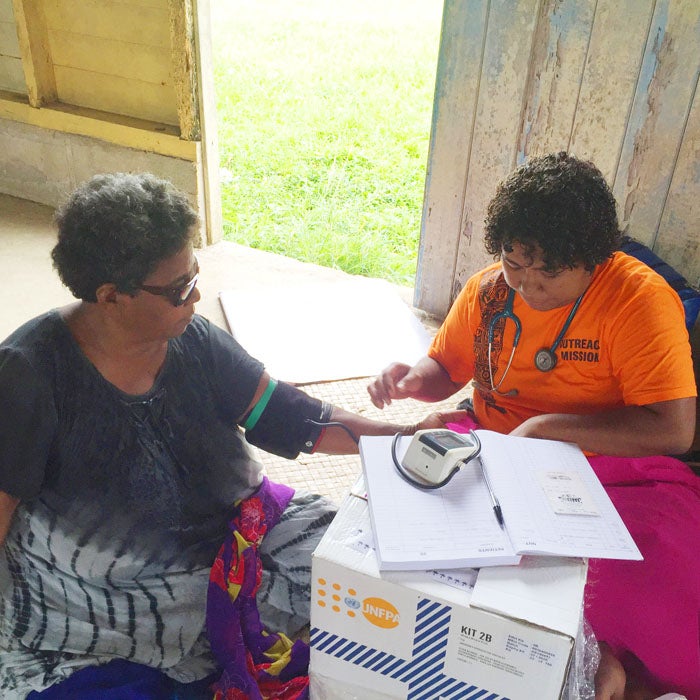Targeted approaches have always been touted the most effective because of its informed direction, regardless of the sector it is applied in; when actions are informed, they are more likely to reach the actual affected population, with services which meet needs.
In the aftermath of Severe Tropical Cyclone Winston, the Government and people of Fiji were offered a barrage of assistance, from people, other countries, institutions and development agencies like the United Nations, which has contributed to national recovery.

The United Nations Population Fund, UNFPA, contributed to the response in various ways, working with the Government of Fiji through its line ministries such as the Ministry of Health and Medical Services and the Ministry of Women, Children and Poverty Alleviation, local partners such as the Fiji Women's Crisis Centre and Empower Pacific and donor partners such as the governments of New Zealand and Australia; this is apart from sourcing funds from the United Nations Central Emergency Resource Fund (UN CERF).
Two of the long-term activities on the ground were the establishment of eight women-friendly spaces in the worst-hit areas and the roll-out of mobile clinic outreach teams, jointly supported by UNFPA and UNICEF.
More than 10,000 people, from infants to elderly women, were reached by the two integrated mobile clinic outreach teams in the Northern Division during a seven-week exercise which targeted hard-to-reach areas severely hit by Cyclone Winston.
Reaching 109 villages and settlements in the Northern Division, the two teams comprising a doctor, dietician, nurses, retired midwives and logistics personnel provided medical services including maternal health and family planning.
"It was a very good program in terms of reaching people who couldn't, for whatever reason, reach the health facilities. We were able to conduct a lot of awareness, information sessions," Dr Kulae Tuisabeto, Nabouwalu/Bua sub-divisional medical officer said.
"It was very encouraging to also note that younger women are coming forward for family planning, including those who were not married. Also, if we are able to reach them where they are, we would have much less number of cases reaching us at hospital.
"It is a good response which we should continue, but we also know that there is no funding. The difference with the response was that we had transportation every day so we were able to reach people who were in remote areas."
Of the 58 villages reached by the Nabouwalu team for example, 83 people were provided with family planning options of their choice, 44 were new acceptors. Pap smears were also conducted, of the 157 women who agreed to have one, 70 were having a pap smear for the first time in their lives. For the same area, 669 children were screened for malnutrition; 285 were found to be underweight.
For the Savusavu/Taveuni team, 51 villages and settlements were reached during the outreach in which 131 pregnant women and lactating mothers were seen. In terms of family planning, of the 135 who took up one of the contraceptive options, 48 were new acceptors. In the same area of coverage, of the 67 women who agreed to a cancer screening, 23 were having a pap smear for the first time.
Accessibility to such sexual and reproductive health services is a basic human right, one of the many reasons why universal access is a core of UNFPA's work.
The UNFPA Pacific Reproductive Health Commodity Security technical specialist, Dr Yann Lacayo, stressed to outreach team members who had gathered in Savusavu that accessibility was critical in saving lives.
"Access to sexual and reproductive health, including family planning and maternal health, for all women and young people is a human right and critical to saving lives, advancing development and promoting gender equality," Dr Lacayo told participants.
"The Family Health Outreach missions created a good opportunity for us to share and learn from each other in our collective efforts to promote sexual and reproductive health across the communities.
"The revisiting of the communities enabled follow-up to the cases seen, referrals to be made and allowed for the collection of data which will become useful in future for planning and responding to future emergencies."
One of the main objectives of the outreach missions was to avoid complications that could arise if reproductive health particularly of mothers, newborns, children and adolescents were not being addressed, said Dr Torika Tamani, Ministry of Health and Medical Services national adviser family health.
Apart from other topics, the outreach teams had to conduct awareness sessions on reproductive health issues including education on safe sex practices, family planning, commodity supply and the provision of family planning services and cervical cancer screenings.
The identification and treatment of sexually-transmitted infections including HIV was part of the services provided by the teams; for (discovered) HIV cases, gender-based violence and/or sexual assault cases, Dr Tamani said there were procedures the medics could follow in terms of reporting.
UNFPA Pacific director and representative Dr Laurent Zessler said the UNFPA was impressed with the results achieved from the roll-out of integrated outreach missions, hailing it a success and an exercise that has met its objectives.
"The mobile clinic outreach missions did not only meet the needs of Fijians in hard-to-reach areas but as a concept that allows an array of medical services taken to the people, it has driven home the importance of accessibility; no one should be left behind," Dr Zessler said.


